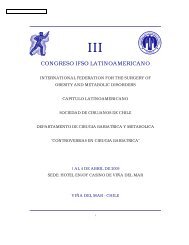Pediatric Clinics of North America - CIPERJ
Pediatric Clinics of North America - CIPERJ
Pediatric Clinics of North America - CIPERJ
Create successful ePaper yourself
Turn your PDF publications into a flip-book with our unique Google optimized e-Paper software.
CHILDHOOD ITP<br />
413<br />
splenectomy is refused or contraindicated. Agents include azathioprine,<br />
cyclophosphamide, danazol, vinca alkaloids, dapsone, cyclosporine, MMF,<br />
or combination therapy. As with adults, current evidence supporting effectiveness<br />
and safety <strong>of</strong> these therapies in children who have severe chronic<br />
refractory ITP is minimal [5,90]. The decision to choose one <strong>of</strong> these agents<br />
or combinations usually is based on physician preferences and experience.<br />
A major difficulty with many <strong>of</strong> these third-line therapies is modest response<br />
rates and frequently a slow onset <strong>of</strong> action. In addition, bone marrow suppression<br />
and an increased incidence <strong>of</strong> infection complicate treatment with<br />
many <strong>of</strong> the immunosuppressive agents. Before physicians can confidently<br />
know the best management for their patients, these treatments, and perhaps<br />
combinations <strong>of</strong> agents and new approaches to treatment, must be evaluated<br />
for effectiveness and safety in prospective cohort studies <strong>of</strong> consecutive<br />
patients or randomized controlled trials. Such trials should include measurement<br />
<strong>of</strong> relevant clinical outcomes (eg, bleeding manifestations and quality <strong>of</strong><br />
life) other than the platelet count alone [90].<br />
Rituximab is a human murine (chimeric) monoclonal antibody directed<br />
against the CD20 antigen expressed on pre-B and mature B lymphocytes.<br />
Rituximab eliminates most circulating B cells with recovery <strong>of</strong> B-cell counts<br />
6 to 12 months after therapy. Rituximab currently is indicated for the treatment<br />
<strong>of</strong> lymphoma in adults. Because <strong>of</strong> its ability to deplete autoantibodyproducing<br />
lymphocytes, it is used <strong>of</strong>f-label to treat patients who have a variety<br />
<strong>of</strong> autoimmune diseases. Experience with rituximab therapy for patients who<br />
have ITP is greatest for adults. In a recent systematic review that involved<br />
313 patients from 19 studies, Arnold and colleagues [91] reported a complete<br />
response rate, defined as a platelet count greater than 150 10 9 /L, in 43.6%<br />
<strong>of</strong> cases (95% CI, 29.5% to 57.7%); 62.5% <strong>of</strong> cases (95% CI, 52.6% to<br />
72.5%) achieved platelet counts greater than 50 10 9 /L. The treatment regimen<br />
used most frequently was 375 mg/m 2 administered weekly for 4 weeks.<br />
The median time to response was 5.5 weeks and the median response duration<br />
10.5 months. Durable responses were more frequent in patients who achieved<br />
complete remission. The largest pediatric series reported data including 36 patients,<br />
ages 2.6 to 18.3 years, six <strong>of</strong> whom had Evans’s syndrome [92].<br />
Responses, defined as a platelet count greater than 50 10 9 /L during 4 consecutive<br />
weeks starting in weeks 9 to 12 after 4 weekly doses <strong>of</strong> rituximab<br />
(375 mg/m 2 per dose), were observed in 31% <strong>of</strong> cases (CI, 16% to 48%). In<br />
adults who had chronic ITP, durable responses lasting longer than 1 year<br />
were more likely in complete responders, and these patients also were more<br />
likely to respond to retreatment after relapse [93,94]. Although these results<br />
are promising, there is an urgent need for randomized control trials to define<br />
the role <strong>of</strong> rituximab as a splenectomy-sparing strategy or as treatment <strong>of</strong><br />
patients who fail splenectomy and who have severe, symptomatic ITP. Clinically<br />
severe, short- and medium-term adverse effects after rituximab therapy<br />
for patients who have ITP fortunately are rare. They include therapyassociated<br />
serum sickness, immediate and delayed neutropenia, and





